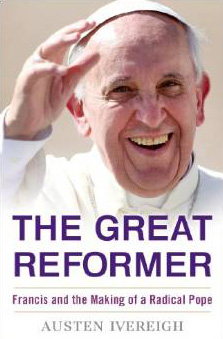A biography of Pope Francis that describes how this revolutionary thinker will use the power of his position to challenge and redirect one of the world’s most formidable religions
An expansive and deeply contextual work, at its heart The Great Reformer is about the intersection of faith and politics–the tension between the pope’s innovative vision for the Church and the obstacles he faces in an institution still strongly defined by its conservative past. Based on extensive interviews in Argentina and years of study of the Catholic Church, Ivereigh tells the story not only of Jorge Mario Bergoglio, the remarkable man whose background and total commitment to the discernment of God’s will transformed him into Pope Francis–but the story of why the Catholic Church chose him as their leader.
With the Francis Revolution just beginning, this biography will provide never-before-explained context on how one man’s ambitious program began–and how it will likely end–through an investigation of Francis’s youth growing up in Buenos Aires and the dramatic events during the Perón era that shaped his beliefs; his ongoing conflicts and disillusionment with the ensuing doctrines of an authoritarian and militaristic government in the 1970s; how his Jesuit training in Argentina and Chile gave him a unique understanding and advocacy for a “Church of the Poor”; and his rise from Cardinal to the papacy.
About the Author
Austen Ivereigh is a London-based Roman Catholic journalist, author, commentator and campaigner. A former deputy editor of The Tablet and later Director for Public Affairs of the former Archbishop of Westminster, Cardinal Cormac Murphy-O’Connor, he frequently appears on radio and TV programmes to comment in stories involving the Church.
The Great Reformer: Francis and the Making of a Radical Pope
Hardcover: 464 pages
Publisher: Allen & Unwin (4 Dec. 2014)
ISBN-10: 176011328X
ISBN-13: 978-1760113285
Buy from HERE
Read Review by New York Times


“If Ivereigh’s predictions about Francis’ mission are right, the market for papal biography may dwindle — for the future of the church will depend far less on the man at its helm.” (Quote from the New York Times Review).
In order to restore the collegial church it would seem Pope Francis is using the power of his office to divest that office of the power if took to itself at the First Vatican Council. Excuse the pun when I say, ‘more power to his elbow!’